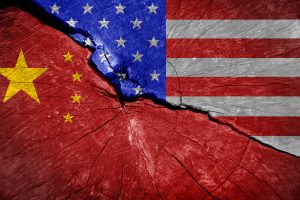On July 25 and 26, U.S. Deputy Secretary of State Wendy Sherman was in Tianjin, China. While the State Department read-out characterized the trip as “meetings with State Councilor and Foreign Minister Wang Yi and other PRC officials,” the Chinese Foreign Ministry made it clear that Sherman’s primary interlocutor was Vice Foreign Minister Xie Feng, the official responsible for North American affairs.
According to Xinhua, China’s state media agency, Xie presented Sherman with two lists: the “List of U.S. Wrongdoings that Must Stop” and the “List of Key Individual Cases that China Has Concerns With.” The full lists were not made available publicly, but Xinhua provided a summary:
In the List of U.S. Wrongdoings that Must Stop, China urged the United States to unconditionally revoke the visa restrictions over Communist Party of China (CPC) members and their families, revoke sanctions on Chinese leaders, officials and government agencies, and remove visa restrictions on Chinese students.
China also urged the United States to stop suppressing Chinese enterprises, stop harassing Chinese students, stop suppressing the Confucius Institutes, revoke the registration of Chinese media outlets as “foreign agents” or “foreign missions”, and revoke the extradition request for Meng Wanzhou [the CFO of Huawei, who was detained in Vancouver, Canada in December 2018].
The “List of Key Individual Cases that China Has Concerns With” apparently touched on similar themes, presumably with specific names attached: “some Chinese students’ visa applications being rejected, Chinese citizens receiving unfair treatment in the United States, Chinese diplomatic and consular missions being harassed and rammed into by perpetrators in the United States, growing anti-Asian and anti-China sentiment, and Chinese citizens suffering violent attacks.”
The mention of Chinese diplomatic missions being “harassed and rammed” is interesting as there have been no public reports of attacks on Chinese consulates or the embassy in the United States. Beijing may be obliquely referring to an uptick in protests outside Chinese missions in the United States.
The exchange recalls China’s aggressive stance on its relationship with Australia, where Beijing similarly released a list of grievances and placed the onus for repairing ties entirely on the other party.
China’s Foreign Ministry also released separate read-outs highlighting different barbs thrown by Xie during his meeting with Sherman, including attacks on the U.S. human rights record, Washington’s “coercive” and “bullying” diplomacy, and a rejection of the U.S. mantra of the “rules-based international order” as another name for “‘the law of the jungle’ where might is right and the big bully the small.”
Notably, Xie had nothing but contempt for the Biden administration’s rhetorical nods to cooperation: “U.S. policy seems to be demanding cooperation when it wants something from China; decoupling, cutting off supplies, blockading or sanctioning China when it believes it has an advantage; and resorting to conflict and confrontation at all costs.”
Foreign Ministry spokesperson Zhao Lijian expanded on that in his press conference on July 26. “The U.S. side sought China’s cooperation and support on climate change, the Iranian nuclear issue, and the DPRK nuclear issue among others,” Zhao said. “In fact, China has been playing a responsible and constructive role on all these issues… The U.S. should adopt a correct view of cooperation. It simply won’t work when the U.S. seeks cooperation with China while harming China’s interests.” (Notably, the State Department also listed Afghanistan and Myanmar as areas where cooperation was discussed.)
Xie placed the full blame for the current “stalemate” in China-U.S. relations on Washington, saying, “Fundamentally, it is because some Americans portray China as an ‘imagined enemy.’”
“The U.S. side needs to change course and work with China on the basis of mutual respect and embrace fair competition and peaceful coexistence with China,” he said.
There was no read-out from China on discussions with Foreign Minister Wang, as though Beijing would prefer to pretend that meeting had not happened. As of this writing, there was no indication of the meeting on the Foreign Ministry’s list of Wang’s recent activities. On the other hand, reading only the U.S. statement gives no indication that Sherman ever met with Xie, who ranks several pegs below her (Sherman is the State Department’s No. 2, while Xie is the third-ranked of four Chinese vice foreign ministers. Sherman also posted a photo of her and Wang on Twitter, but no images of her with Xie.
Sherman’s stop in Tianjin reportedly almost didn’t happen because China wanted her to meet with Xie, while the U.S. demanded a more senior dialogue partner. The different read-outs allow both sides to pretend they won that particular battle.
The State Department read-out does share one thing with the Chinese Foreign Ministry’s: Both read as little more than a laundry list of complaints. The State Department said that Sherman:
… raised our concerns about human rights, including Beijing’s anti-democratic crackdown in Hong Kong; the ongoing genocide and crimes against humanity in Xinjiang; abuses in Tibet; and the curtailing of media access and freedom of the press. She also spoke about our concerns about Beijing’s conduct in cyberspace; across the Taiwan Strait; and in the East and South China Seas.
Sherman also decried the arbitrary detentions of U.S. and Canadian citizens in China and “the PRC’s unwillingness to cooperate with the World Health Organization and allow a second phase investigation in the PRC into COVID-19’s origins.”
The blistering tone of the official read-outs on both sides is tough to square with Zhao’s comment that “On the whole, the talks have been profound, candid and helpful for the two sides to gain a better understanding of each other’s position and seek healthy development of China-U.S. relations going forward.”
































